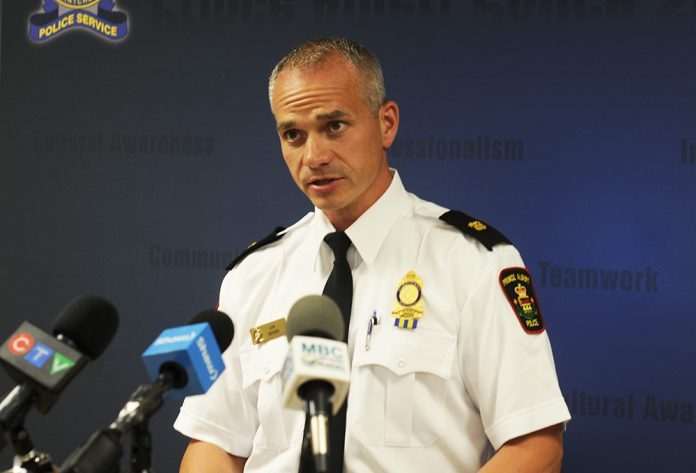
The violent crime severity index is headed in the right direction, but challenges still exist when it comes to property crime, the city’s acting police chief says.
Jon Bergen, acting chief of police, spoke to the Herald Tuesday about Monday’s release of the police reported crime statistics by Statistics Canada. The release included both data about the numbers and kinds of incidents, as well as the crime severity index, which weights crimes based on their average prison sentence against an area’s population. The report also breaks that down further into violent crime severity index as well as a non-violent crime severity index.
“The non-violent crime index didn’t fall, it stayed consistent with the previous year (in terms of overall ranking,” Bergen said.
“The overall crime placement, we’re down one spot, and the violent crime, the fact that we moved from third place to sixth is in the right direction. That’s the one that really speaks to public safety.”
Bergen said it’s important to keep working on non-violent crime too, but seeing the drop in violent crime severity is a higher priority because of public safety.
Non-violent crime, which includes property crime, is still a challenge in Prince Albert, Bergen said. That’s in part due to problems associated with drug use and addiction.
‘We have several different approaches to investigating property crime, but it is a challenge we have,” Bergen said.
‘When we use technology and when the community uses technology, that supports investigations.”
Bergen said things such as alarm systems or video surveillance can aid police. He also said the department has new policies surrounding public contact interviews on the street.
“There is still ongoing education and enforcement, but it’s a difficult one to see significant gains because property crime is typically driven by addictions,” he said.
‘Somebody who has to feed or fuel an addiction will typically turn towards minor property thefts to support their addictions.
Overall, the number of reported incidents fell by about 200. According to Bergen, that’s because fewer thefts were reported in 2017.
“A lot of that can be on the larger stores in the community that are either taking different measures or are not reporting,” he said.
‘We think it’s some proactive measures, but we’re not getting (as many) reports, so it could be a number of things.”
Another change this year was the way police departments across the country reported unfounded sexual assault charges. The change comes from a lengthy investigative piece done by Globe and Mail journalist Robyn Doolittle. That report found that police, nationwide, dismissed one in five sexual assault accusations as baseless. Since last year, police forces have worked with Statistics Canada to better report how many sexual assault charges were ruled unfounded. Marking a case as unfounded indicates the case is a malicious or mistaken report. Like other police forces across the country, over the past year, the Prince Albert police reviewed its sexual assault reports marked unfounded.
According to the Globe and Mail, from 2010-2014, 16 per cent of all allegations were marked as unfounded. According to their reporting, on average, two to eight per cent of all sexual assault complaints are malicious.
The percentage of sexual assault cases marked as unfounded has fallen, both nationwide and in Prince Albert. Of the 60 incidents of sexual assault reported to police in 2017, eight, or 11.76 per cent, were marked as unfounded.
“Every (police force) is somewhat different, but what we do now is we ensure we review each unfounded file,” Bergen said.
“What we found in our review of (sexual assault investigations) was it was really coding the files. The files were investigated to the best of our ability, but in a couple of instances they weren’t coded properly.”
Bergen said he thinks the general increase in reports of sexual assault (Prince Albert saw four more than the previous year, with the rate staying pretty constant), is due to a number of factors. He said some of it is greater public awareness thanks to the MeToo movement, but he also thinks as police improve, people will gain confidence in how the police handle their cases and will be more likely to report.
He acknowledged, though, that there are still a high number of incidents that go unreported.
This sort of data monitoring crime trends is very useful, Bergen said, but the numbers released by Statistics Canada are seven months behind. To truly keep tabs on what is happening in Prince Albert and in the wider province, police need to keep track of the numbers daily. Bergen said internally, the police service reviews calls twice a day and uses analytics to watch for crime trends.
“We need to look at current crime trends and deploy resources in real time,” he said.
‘These are the trends that we looked at last year. The firearm (offences) up in Saskatchewan, mostly in rural areas we were monitoring that last year. We can focus and mobilize where we need to when they’re occurring,” he said.

